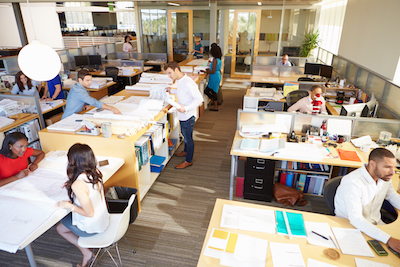Employee Perks and Retention
Fortune magazine recently released their 2014 list of “100 Best Companies to Work For.” I can’t help but read through the perks offered by these companies and fantasize about what it might be like to work there. Some perks are quite attractive. However, employee perks have to be weighed alongside other characteristics of the workplace.
Company culture has certainly changed since millennials began to age up and move into middle and upper management. Employers recognize that the millennial generation has different work habits and different expectations. Demographic studies tell us that within the next five years millennials will account for nearly half the workers in the world.
It’s no wonder that companies are reinventing their culture to attract and retain these workers. You know how they say that age is a state of mind? Millennial status is much the same. Millennials are technically defined as those born between 1977 and 1997. Surveys show that likes and dislikes of typical millennials actually spill over into other generations in the workplace.
There are older workers who enjoy many of the same likes that millennials tend to have. Likewise, there are many millennials who don’t fit the mold that is being forced upon them. Let’s examine a few practices found at some of the Top 100 companies. Each may have positive and negative effects on employee satisfaction and retention.
Is an open office environment killing productivity?

A private office used to be a perk or perhaps a status symbol. But these days many employers are getting rid of offices altogether. You may not even see the traditional cube partitions. All pretenses of privacy are gone. The open floor plan so popular in modern homes, has spilled over into the workplace.
Facebook founder Mark Zuckerberg sits at a table in the middle of a big room with a dozen or more other employees. But he’s not there from 9 to 5 every day. Other workers are and this office environment would drive me crazy. I understand the team concept and agree that working in teams is more productive for a variety of reasons. However, I don’t want to be holding hands with my team 24/7.
I hate sitting next to a co-worker who is blowing her nose. I can’t stand being a foot away from someone who is eating a smelly tuna sandwich or crunching carrots. Some co-workers play music on low volume and don’t use headsets. Get 12 people in a room doing that and it sounds like late night static on AM radio.
Then there’s the encounter experience. Someone asks a question and another team member answers. They get into a really interesting discussion about a concept. Others join in and pretty soon I’m sucked in, too. In many workplaces this type of impromptu brainstorming is encouraged. The workspace design in modern offices is supposed to inspire these serendipitous encounters.
But how many times is any gain offset by the distraction factor? I hate it when I am focusing on a task and get bombarded by the office environment. Here I am, close to solving a problem that is sure to win me a Nobel Prize in physics, and someone in the room cranks up the thermostat and starts crunching chips. I can’t think of anything else after that. I’m done for the day!
While others may thrive in this open office environment I know my limitations. Just put me in a little corner somewhere and tell people to leave me alone. I want my own space. I don’t want co-workers passing by to comment on my work or see what I’m doing. Facebook wouldn’t be the place for me. Not unless there’s a Prozac dispenser and a water cooler right there at the end of my table.
Is the atmosphere too distracting?
Closely related to the open office environment, is the trend to encourage creativity and fellowship by raucous displays of fun. Believe it or not there are some company cultures where you’ve got people singing and dancing in the aisles all the time. Zappos is known for this. They are a phenomenally successful company and are well known for exceptional customer service.
Employees say it’s a fun place to work. But I know it’s not my cup of tea. Zappos is big on celebrations. If a team meets its sales goal they organize an impromptu parade complete with costumes, dancing, and associated revelry. I’m just not an associated revelry kind of guy. I’m more of a “leave me alone and let me finish this project” kind of guy.
I don’t like boas thrown in my face. I don’t like crazy people running to the front or the room ringing bells and making personal announcements about their cats. I’d rather poke a pencil in my eye. It reminds me of a frat house at a party school. So, I admit Zappos is probably not the place for me. Not unless they make Mardi Gras beads out of Prozac and toss me some as the band marches by my desk.
Do freebies create an entitlement mentality?

Here’s one you may disagree with, but hear me out. I appreciate kind gestures from a company. And if you put donuts out in the morning and have free bottled water or coffee, I’ll take it. Employee perks are intended to de-stress employee’s lives and show them the company values their work.
I’ve worked at companies with great employee perks but Google really takes perks to an extraordinary level. Employees get free haircuts, a company gym, game tables, laundry facilities, onsite medical care, and those famous nap pods. An employee can eat all three meals free at any company café; and if you can’t make it to a café each building has a snack room with a generous selection available there. Free! Gratis! Nada!
Somehow this freaks me out a little. It makes me feel like a child and the company is my proxy parent telling me to eat, sleep, and play. I know the theory is that if you have everything available to you there at the worksite you will be less stressed. You will naturally spend more time at work and be more productive. These perks will create company loyalty and increase the employee retention rate. (You might want to look at our Seven Secrets to Employee Retention)
Who would ever want to leave? Pretty soon they’ll need a company nursing home for employees who refuse to retire. I don’t know. It all seems sort of Orwellian to me. It also appears to create a sense of entitlement.
I’ve heard various employees in the Silicon Valley use all sorts of skewed logic. “The company has bagels in the lounge but they should really have cream cheese, too. And jelly! And clowns!” “We have free parking here at work, so why don’t they pay for my parking at home in the city if I ride their bus to work?” Yes, I forgot to mention the free busses that transport employees from home to work and pay them an incentive to ride.
There’s nothing wrong with employee perks. Most companies in the Top 100 sprinkle perks sparingly. That way you can savor them when you get them. Frankly, I like the feeling of providing for myself. I’m a grown man and I can buy my own clowns! I don’t think I’d be happy working at Google. Unless, of course, there’s a drugstore on site where I can get my Prozac for free.
Employee Perks and Company Culture
It’s just something to think about. The Top 100 are all great places to work. But often people confuse perks with company culture. Perks are extra niceties the company provides to valued personnel. Certainly, employee perks draw potential applicants to an organization and are proven to help raise the retention rate.
However, a company’s culture is different. It includes the preferred management style. Are managers approachable with an open door policy, or are there bureaucratic ladders that must be climbed? Can you cultivate and propose a new idea, or are you expected to do your job and let the executives do the innovating?
Company culture includes unwritten rules about working hours and leave time. It also reflects the work atmosphere itself. Will you have an individual work space? Is the atmosphere quiet or does it feel like the floor of the New York Stock Exchange?
When considering a new job be sure to look beyond employee perks at the overall company culture. Before you apply for that dream job, dig a little deeper and be honest with yourself. You might find yourself a stranger in paradise, if you don’t!


